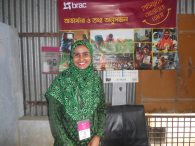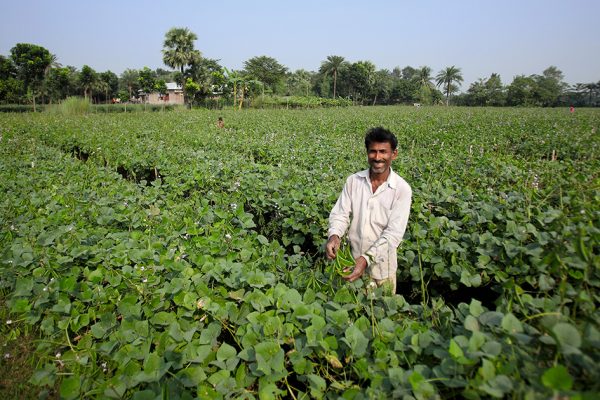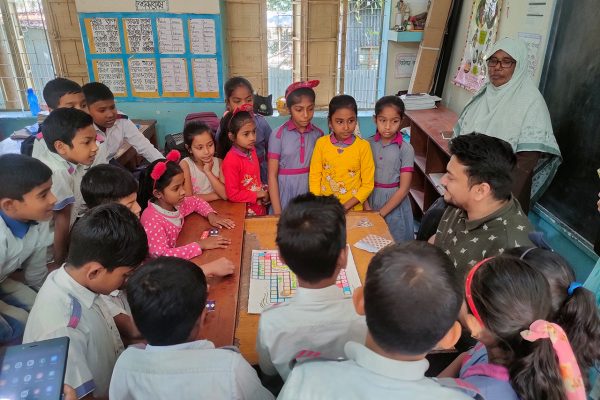Customer service at BRAC: Empowering women through empowered women
Reading Time: 3 minutes
Even when introducing herself, Babita’s enthusiasm is contagious. “Maybe you think that you can’t change how you manage your money. It’s too hard. Well, I used to think that I could never get up in front of a group of people and give a presentation. But here I am. BRAC taught me how. So if I can do this, then you can do anything.”
This piece was originally posted on the Center for Financial Inclusion blog.
Even when introducing herself, Babita’s enthusiasm is contagious. “Maybe you think that you can’t change how you manage your money. It’s too hard. Well, I used to think that I could never get up in front of a group of people and give a presentation. But here I am. BRAC taught me how. So if I can do this, then you can do anything.”
Babita Akhtar is one of 900 women recruited by BRAC as a customer service assistant. She greets every person who walks into the branch office—people coming for loans, seeking support from BRAC’s legal aid clinics, teachers or community health promoters coming for training, and even visitors. Before loan disbursement begins, she runs a short orientation session for all borrowers that covers important information about the loans, BRAC’s services, and good financial practices. The branch manager comes in at the end to answer any questions and greet the clients personally.
The messages provided in this orientation are timed for maximum impact. Pranab Banik, who heads BRAC’s financial education and client protection unit, said, “The time when clients are waiting at the branch to take a loan seems the best moment to deliver basic financial awareness at scale and cost effectively. Our pre-disbursement orientation is an integral precondition for comprehensive client protection; it is intended to empower all clients to better understand their options and manage their finances responsibly.”
In the afternoon, Babita provides financial education to a small group of vulnerable clients, each recommended by their programme organisers. Like the pre-disbursement orientation, this workshop is highly participatory with visual materials developed with ongoing client feedback. Across four afternoon sessions, clients cover topics including: good savings habits, the dangers of overindebtedness, and rights of clients.
Client feedback so far has been encouraging. An independent review by BRAC’s monitoring unit found that nearly all women felt that they had learnt important practical lessons such as the risks of borrowing on behalf of others, effective ways to use loan money, and the importance of savings.
Last year, BRAC provided pre-disbursement orientation to over 800,000 clients and financial education to 85,000. This year, we’re planning to scale up the customer service assistant model to virtually all of our 2,200 branches to make this service universal.
But just setting up a new desk with a pretty banner, hiring a new person, and conducting a few educational sessions isn’t enough to ensure customer service. This is one of several initiatives that the BRAC Microfinance programme is taking to improve its engagement with clients.
It’s clear that many of the operational staff keenly feel their responsibilities to their clients. Mr Md Sakhawat Hossain, branch manager, explains, “Customer service is not the work of the customer service assistant alone. It’s a core activity for all field staff, including me. We are putting in continuous effort on that as a team, particularly during the time of regular meetings with clients held in the community.”
Customer service is an important dimension of client protection, which is gaining recognition as a top priority for financial inclusion. Last fall, BRAC and the Smart Campaign hosted a client protection workshop in Dhaka to bring together leadership from across Bangladesh’s microfinance sector. With over 700 recognised microfinance institutions including some of the oldest in the world, Bangladesh has a mature sector credited for foreseeing and averting the crises that affected many other markets in past years.
Yet to date, not one microfinance institution has received Smart Certification, signaling that there is still much more work to be done. Earlier this month, in partnership with Bangladesh’s Credit and Development Forum (CDF) and the Smart Campaign, we hosted a training on the Client Protection Principles (CPPs) with 19 participating institutions.
Mr Fazlul Hoque Khan, director of the Center for Development Innovation and Practices, commented, “When I received the invitation for participation in the three day long [Client Protection Principles] training course, I was very reluctant to attend. But at the end of my [training] on the CPPs, I am fully convinced that executing the Client Protection Principles is not only necessary to protect the clients, it is also necessary to ensure the healthy growth and sustainability of the MFI industry as a whole.”
Bangladesh’s microfinance sector has a rich history of empowering women through financial services and innovating for scale. BRAC’s customer service assistants are an example of what’s possible when these skills are applied to client protection. We hope that this is just the beginning.
Maria May is a senior programme manager at BRAC’s microfinance programme, and social innovation lab.






